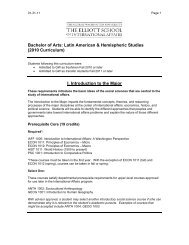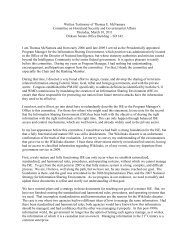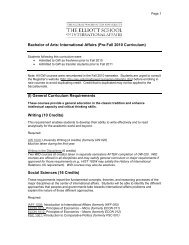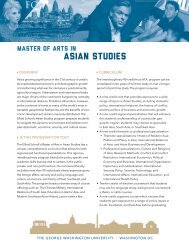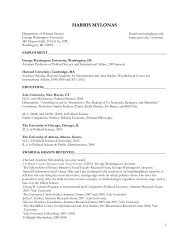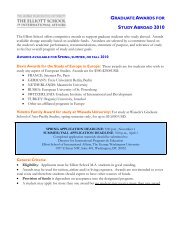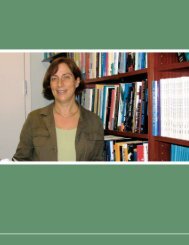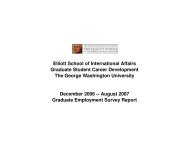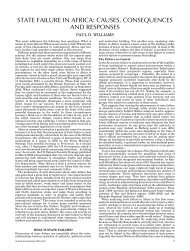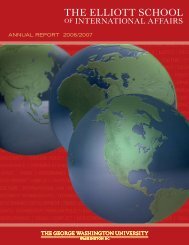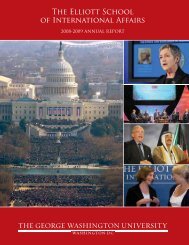engaging the world - Elliott School of International Affairs - The ...
engaging the world - Elliott School of International Affairs - The ...
engaging the world - Elliott School of International Affairs - The ...
Create successful ePaper yourself
Turn your PDF publications into a flip-book with our unique Google optimized e-Paper software.
issues related to Afghanistan. Marc Lynch met<br />
with <strong>the</strong> Obama administration’s Detention Policy<br />
Task Force to discuss <strong>the</strong> implications <strong>of</strong> closing<br />
<strong>the</strong> Guantanamo Bay detention center. He also<br />
advised senior administration <strong>of</strong>ficials on public<br />
diplomacy and counterterrorism issues, and he was<br />
<strong>the</strong> featured speaker at a summit on countering<br />
violent extremism convened by <strong>the</strong> U.S. Department<br />
<strong>of</strong> State in November 2009. Sean Roberts briefed<br />
<strong>the</strong> participants <strong>of</strong> a joint State Department and<br />
USAID task force on Kazakhstan. Jerrold Post testified<br />
before <strong>the</strong> Webster Commission investigating <strong>the</strong><br />
Fort Hood massacre.<br />
Under <strong>the</strong> direction <strong>of</strong> Pr<strong>of</strong>essor Henry R. Nau, <strong>the</strong><br />
U.S.-Japan Legislative Exchange Program (LEP) and<br />
<strong>the</strong> U.S.-Japan-South Korea Trilateral Legislative<br />
Exchange Program (TLEP) brought toge<strong>the</strong>r<br />
lawmakers from Japan, South Korea, and <strong>the</strong> United<br />
States for briefings on a broad range <strong>of</strong> political,<br />
economic, and security issues. <strong>The</strong> LEP, which began<br />
in 1989, completed its 43rd session in Washington<br />
in May 2010, with discussions focusing mainly on<br />
regional security issues related to North Korea and<br />
China. <strong>The</strong> 11th TLEP session also took place in May<br />
2010; <strong>the</strong> principal topics discussed were <strong>the</strong> U.S.-<br />
Korean free trade agreement and North Korea. A<br />
special feature <strong>of</strong> <strong>the</strong>se meetings was a reception<br />
honoring Iwao Matsuda, <strong>the</strong> Japanese Diet member<br />
who helped to start <strong>the</strong> program. More than 171<br />
members <strong>of</strong> Congress and 80 members <strong>of</strong> <strong>the</strong><br />
Japanese Diet have participated in <strong>the</strong> U.S.-Japan<br />
exchange since its founding.<br />
(L-R) Iwao Matsuda, member, House <strong>of</strong> Councillors,<br />
Japanese Diet; Mike Honda, member, U.S. House<br />
<strong>of</strong> Representatives; and Henry R. Nau, pr<strong>of</strong>essor <strong>of</strong><br />
political science and international affairs, GW, at a<br />
May 2010 meeting <strong>of</strong> <strong>the</strong> U.S.-Japan-South Korea<br />
Trilateral Legislative Exchange Program.<br />
Sean Roberts, director <strong>of</strong> <strong>the</strong> <strong>Elliott</strong> <strong>School</strong>’s<br />
<strong>International</strong> Development Studies program<br />
iLLUMiNATiNG CoMPLeX iSSUeS<br />
During 2009-10, <strong>Elliott</strong> <strong>School</strong> faculty members<br />
commented on international affairs developments<br />
more than 900 times in national and international<br />
media outlets, including: <strong>the</strong> New York Times,<br />
BBC News, Al-Jazeera, CNN <strong>International</strong>, NPR,<br />
<strong>the</strong> Washington Post, <strong>the</strong> Wall Street Journal, <strong>the</strong><br />
Associated Press, Agence France-Presse, Reuters,<br />
and <strong>the</strong> Christian Science Monitor. <strong>Elliott</strong> <strong>School</strong><br />
faculty members also published more than 85 opeds<br />
in leading outlets such as <strong>the</strong> New York Times,<br />
<strong>the</strong> Washington Post, ForeignPolicy.com, <strong>the</strong> South<br />
China Morning Post, Asia Times online, and Science<br />
magazine.<br />
A CoMMiTMeNT To SeRViCe<br />
Members <strong>of</strong> <strong>the</strong> <strong>Elliott</strong> <strong>School</strong> community are<br />
committed to making <strong>the</strong> <strong>world</strong> a better place.<br />
Seventy-five percent <strong>of</strong> our 2009 master’s program<br />
graduates are pursuing careers in <strong>the</strong> nonpr<strong>of</strong>it or<br />
public sectors. In 2010, GW had more Presidential<br />
Management Fellowship finalists than any o<strong>the</strong>r<br />
university, with <strong>the</strong> <strong>Elliott</strong> <strong>School</strong> contributing 18<br />
finalists to <strong>the</strong> GW total.<br />
Many <strong>of</strong> our alumni have distinguished careers<br />
in government. <strong>The</strong>se include <strong>Elliott</strong> <strong>School</strong><br />
commencement celebration speaker Rose<br />
Gottemoeller (M.A. ’81), <strong>the</strong> U.S. assistant<br />
secretary <strong>of</strong> state for verification, compliance, and<br />
implementation. Ms. Gottemoeller spent much <strong>of</strong><br />
2009 and <strong>the</strong> early part <strong>of</strong> 2010 as <strong>the</strong> lead U.S.<br />
negotiator on <strong>the</strong> new strategic arms reduction<br />
iN SeRViCe To THe CoUNTRY<br />
Gen. John Shalikashvili (ret.), Former Chairman,<br />
Joint Chiefs <strong>of</strong> Staff<br />
After graduating high school in Peoria, Illinois, John<br />
Shalikashvili (M.A. ’70) attended Bradley University<br />
and was trained as a mechanical engineer.<br />
“My first position as an engineer was with Hyster Lift<br />
Truck Company. For my first task, I was asked to take<br />
<strong>the</strong> smallest Caterpillar lift truck and put it on wheels.<br />
When I finished, <strong>the</strong> truck was able to stop, but when<br />
you pressed <strong>the</strong> brake, it would tip and fall onto its<br />
radiator. After that, I decided it was time to change<br />
career paths.”<br />
As if on cue, <strong>the</strong> U.S. Army intervened. Gen.<br />
Shalikashvili was drafted shortly after he started<br />
working at Hyster and soon <strong>the</strong>reafter was selected to<br />
attend Officer Candidate <strong>School</strong>. His first assignment<br />
was on ski patrol in Alaska, keeping American air<br />
bases secure from <strong>the</strong> Soviet Union at <strong>the</strong> beginning<br />
<strong>of</strong> <strong>the</strong> Cold War. From <strong>the</strong>re, he was posted to<br />
Europe, <strong>the</strong>n Vietnam. During 1969-1970 while in a<br />
stateside assignment, he worked on his GW degree.<br />
“When many years ago, [GW] awarded me a<br />
Master <strong>of</strong> Arts degree in international affairs, little<br />
did I suspect how that would shape my military<br />
career and indeed my life,” Gen. Shalikashvili said<br />
upon accepting an honorary degree at GW’s 2004<br />
commencement.<br />
“And how I would draw on what I had learned from<br />
this great faculty, throughout my subsequent years<br />
wearing our nation’s uniform, but particularly in my<br />
later years—as deputy commander <strong>of</strong> our army in<br />
Europe at <strong>the</strong> time when <strong>the</strong> [Berlin] Wall was coming<br />
down; later still as <strong>the</strong> commander <strong>of</strong> NATO forces in<br />
Europe, Supreme Allied Commander in Europe, when<br />
<strong>the</strong> Balkan wars were raging; and <strong>the</strong>n finally…when<br />
I came here to Washington as Chairman <strong>of</strong> <strong>the</strong> Joint<br />
Chiefs <strong>of</strong> Staff.”<br />
Gen. Shalikashvili was named NATO Supreme Allied<br />
Commander for Europe (SACEUR) in 1992. He<br />
returned to Washington <strong>the</strong> next year to become<br />
<strong>the</strong> thirteenth Chairman <strong>of</strong> <strong>the</strong> Joint Chiefs <strong>of</strong> Staff.<br />
He said his experiences as a child in Warsaw during<br />
World War II and later as a military <strong>of</strong>ficer in Vietnam,<br />
Korea, and Iraq taught him <strong>the</strong> harsh realities <strong>of</strong> war.<br />
“In all my experience, I have learned that war is<br />
terrible. We should fight only when we must.”<br />
In fact, <strong>the</strong> general has said that one <strong>of</strong> <strong>the</strong> highlights<br />
<strong>of</strong> his career was overseeing Operation Provide<br />
Comfort, <strong>the</strong> relief operation that returned hundreds<br />
<strong>of</strong> thousands <strong>of</strong> Kurdish refugees to Nor<strong>the</strong>rn Iraq.<br />
“So few have <strong>the</strong> opportunity to work directly on a<br />
project that will save lives and restore communities,”<br />
said Gen. Shalikashvili. “Operation Provide Comfort<br />
gave relief to an entire population. I was able to<br />
personally see <strong>the</strong> effect that our efforts had, as <strong>the</strong><br />
Kurds were able to return to <strong>the</strong>ir homes and reunite<br />
with <strong>the</strong>ir families. It was a priceless feeling to be<br />
involved in such a powerful movement.”<br />
Although he suffered a stroke in 2004, <strong>the</strong> general<br />
is still active on a number <strong>of</strong> boards. He is also a cochair<br />
<strong>of</strong> Friends <strong>of</strong> American Lake VA Golf Course,<br />
a project that rehabilitates wounded veterans<br />
through golf.<br />
36 2009/2010 annual report <strong>the</strong> elliott school <strong>of</strong> international affairs 37



